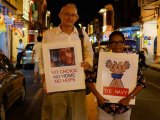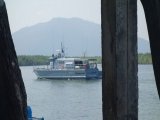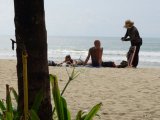Morison and Phuketwan colleague Chutima Sidasathian have been accused of criminal defamation and face a Computer Crimes Act charge in a precedent-setting action by Thailand's Royal Thai Navy.
The military-versus-media court action has raised alarm in Thailand because in genuine democracies, the military doesn't sue the media - it makes telephone calls or holds media conferences.
Action by the military and other agencies in relation to the Rohingya boatpeople now streaming by sea from Burma remains covert, despite international concern and the lowering of Thailand to the bottom level in a recent US State Department Trafficking in Persons report.
Morison and Khun Chutima have been reporting on the Rohingya saga since 2008. Their revelations are believed by many to be the reason why the Royal Thai Navy applied heavy-handed action instead of making a telephone call or holding a media conference.
The 41-word paragraph cited in the charge was quoted word for word by Phuketwan from the Reuters news agency, which subsequently won the Pulitzer for coverage of the Rohingya that included the contentious paragraph.
Reuters and other news outlets in Thailand and around the world that published the same paragraph have not been charged.
Morison's Australian passport is being held pending resumption of the journalists' trial in July next year. Unless he has his passport returned, Phuketwan is likely to be forced to close when his work permit expires in February.
Earlier this month, the British Government applied to a Thai court for the return of the passport of British human rights defender Andy Hall - and the court granted the request.
Morison and his sisters are now asking the Australian Government to follow the example set by the British Government and ask for the return of his passport.
Prime Minister Tony Abbott,
Parliament House, Canberra.
cc Foreign Minister Julie Bishop
Opposition Leader Bill Shorten
Dear Prime Minister,
We are deeply concerned over a matter of principle involving Australia's reputation as a defender of free speech and the rights of Australian citizens to be certain their government will defend them from unjust treatment anywhere in the free world.
Our brother Alan Morison, an award-winning journalist in Australia and the South East Asia region, has been falsely accused of criminal defamation. The harsh Computer Crimes Act is also being applied against him and a colleague by the Royal Thai Navy.
This unprecedented military versus media court action has been condemned by the Office of the United Nations High Commissioner for Human Rights, Human Rights Watch, Amnesty, Reporters Without Borders, the Committee to Protect Journalists and many other rights groups.
Our father is about to turn 91 years old, and in rapidly declining health. Because our brothers' passport has been seized, he is not permitted to leave Thailand. He has been told any application for temporary use of his passport will require an emergency of some kind.
As the case is not due to resume until July next year, Alan remains a prisoner in Thailand.
Last week, Andy Hall, a British activist on behalf of migrant workers facing similar charges, regained his passport when the British Government intervened. The court's response was to return Mr Hall's passport, unconditionally.
Like Mr Hall, my brother is a long-time resident of Thailand and not a flight risk. Like Andy Hall, and on the basis of their award-winning coverage of the Rohingya boatpeople, our brother and his colleague Chutima Sidasathian could also be rightly classified as human rights defenders.
We would now welcome the Australian Government adopting the same approach as the British Government and asking for the Phuket Provincial Court to return my brother's passport.
Yours respectfully in peace,
Jenny Braddy,
Cathy Schmierer
Jill Morison
Lisa Kovaleff
United Nations
''Criminal prosecution for defamation has a chilling effect on freedom of the press,'' said Ravina Shamdasani, the spokesperson for the Office of the High Commissioner for Human Rights. ''International standards are clear that imprisonment is never an appropriate penalty for defamation.''
Human Rights Watch
''The Thai navy's lawsuit is a reckless attempt to curtail journalists' reporting on alleged human trafficking by its officers,'' said Brad Adams, Asia director at Human Rights Watch. ''Unless the government withdraws the case, its impact will be felt far beyond those reporting on abuses against the Rohingya - and could have a choking effect on all investigative reporting in Thailand.''
Reporters Without Borders
"It is intolerable that journalists are being prosecuted for just doing their job by relaying information of general interest that had already been made public," Reporters Without Borders said. "Bringing charges under the controversial Computers Crimes Act in a defamation case is indicative of the critical state of freedom of information in Thailand and amounts to an attempt to gag the media. We support these journalists, who are facing a jail term, and we call for the immediate withdrawal of these proceedings."
Committee to Protect Journalists
''Rather than shooting the messenger, the Royal Thai Navy would be better suited launching an internal investigation into the serious allegations of abuse that have been raised,'' said Shawn Crispin, CPJ's senior Southeast Asia representative. ''This type of legal intimidation aims ultimately at discouraging media reporting on allegations of serious human rights abuses.''
Chris Lewa, director of the rights group the Arakan Project
''Thanks to the fair investigative reporting by the Phuketwan journalists, the involvement of various Thai agencies in the massive smuggling and trafficking operations of Rohingya refugees and their related miseries is no more a secret. Rights groups should unite to call on Thailand to quash these defamation charges.''
Phuketwan
''We wish the Royal Thai Navy would clear its reputation by explaining precisely what is happening to the Rohingya in the Andaman Sea and in Thailand,'' Phuketwan said in a statement released in response to the charges. ''By instead using a controversial law against us, the Navy is, we believe, acting out of character.''
Bangkok Post
The action makes the navy look like a bully, and gives the impression the admirals would like to intimidate the media. Instead of defending the navy's honor, the criminal defamation suit holds it to question. Instead of silencing the media about the story - concerning the navy's role in the mistreatment of Rohingya boatpeople - the lawsuit repeats it, to more people and at greater length.
CNN
Morison said: "The navy's action over one paragraph has created a perfect storm. If the navy proceeds with the case, the Rohingya issue is now tied up in their action against media under a controversial
law."
TIME
In the meantime, calmer seas mean that even more Rohingya are expected to attempt the treacherous journey in the weeks ahead. Nothing could gladden the traffickers more.
Reuters
Barb Burg, Reuters' (former) global head of communications: ''Our story was fair and balanced and Reuters has not been accused of criminal libel.''
Bill Barnett (The Phuket Insider)
The issues which have drawn Phuketwan into this fray are profound and disturbing. There should be no need to wax over reality and respect needs to be given to those who stand up for the helpless who cannot help themselves.
Andrew Drummond (Investigative Journalist)
We should all support journalists who are doing a difficult job here
under laws which best suit a totalitarian state.
Excellence in Human Rights Reporting, Investigative Reporting awards
In 2010 the Phuketwan team shared the Society of Publishers in Asia Award for Excellence in Investigative Reporting and a second Award for Excellence in Human Rights Reporting, both with the South China Morning Post newspaper. Judges said of the Excellence in Investigative Reporting award: ''An excellent series that uncovered serious government abuses and had a material impact in correcting them. Exclusivity. Strong reporting. Hard-hitting piece with international implications.''
Of the Excellence in Human Rights Reporting award, the judges said:
''Excellent investigative work that exposed serious human rights
abuses of oppressed people. Intrepid reporting of a hidden subject.
This is a high-caliber series buttressed by solid on-the-ground
reporting and great pictures. All militaries are challenging subjects
for investigative reporters and Thailand's is no exception. The team clearly went to great lengths to get sources, break news, and provide the details that prodded the government into action.''














Of Course the Passport should be returned. The "Government" of Thailand or the Army must admit that they have made a mistake and should Drop this case. In case they will continue they will get even bigger problem from "The World"
Posted by Mj on September 17, 2014 10:22